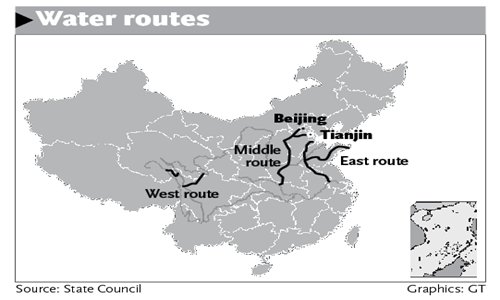
Beijing less dependent on polluted groundwater
China's largest water diversion project in history has so far transferred 7.3 billion cubic meters of water from southern to northern China, benefiting 87 million people.
The Office of the South-to-North Water Diversion Project Commission of the State Council announced on Monday that since the first stage of the eastern route started in December 2013, it has transferred 1.1 billion cubic meters of water from the Yangtze River to cities in Shandong Province, including Jinan, Dezhou and Weihai, benefiting over 40 million people and greatly alleviating the water shortages.
The office also said about 6.2 billion cubic meters of water has been transferred to central and northern China through the project's middle route, which starts from the Danjiangkou Reservoir in Central China's Hubei Province, benefiting 47 million people in Beijing, Tianjin, and Hebei and Henan provinces.
Over the years, the man-made engineering feat has been subject to many controversies and questions. Some foreign media have questioned whether the benefits would outweigh the costs, and have described the project as a "high-risk gamble," while some questioned whether the water transported is clean and safe, and that the project risks doing long-term damage to two of China's most important rivers.
Water experts pointed out effective measures to curb pollution as well as ecological environment construction have been conducted to guarantee the water quality along the routes, and tap water quality in the northern cities was found to have been improving since the water diversion project began.
Record level
After a journey of over 1,200 kilometers along the project, the southern water has supplied over 70 percent of tap water to downtown Beijing, covering more than 11 million residents.
Liang Li, Beijing Waterworks Group spokesperson, said because of water from the diversion project, water stored at Miyun Reservoir, Beijing's largest, reached a 16-year record of 1.6 billion cubic meters. The capital's water quality has also been improving as their monitoring shows that the hardness of the capital's tap water has dropped from 380 milligrams per liter to 130 milligrams per liter.
Beijing previously relied heavily on groundwater with high calcium and magnesium content that clogged showerheads and stiffened laundry.
Office director E Jingping told media on Monday that the massive project plays an important role in the ecology, combating drought, flood drainage and improving the water quality in northern regions.
Shi Weixin, the chief designer of the project in Beijing, told the Global Times that the project has effectively slowed the subsiding of the underground water level. "Tests show that the water quality was generally better than in the Danjiangkou Reservoir," Shi said.
A Reuters report in 2014 said that the water was barely useable when it reached Tianjin because it picked up pollutants and sediments while flowing north through polluted soil.
Shi said that the claim was "hyped" as they have sealed the pipes to prevent contamination. Moreover, along with the pipe, 200-meter green belts have been established to form an ecological corridor. Monitoring facilities have likewise been set up along the water route.
Mixed reactions
The project has also prompted the Shandong provincial government to invest heavily in environmental protection. Since the eastern route began to operate, the government has shut down hundreds of paper mills which previously contributed to 70 percent of pollutants to the city.
But the diversion project is not without its critics.
Some experts pointed out that the project has led to drop in the water level of the Hanjiang River, further polluted the water and led to a sharp decline in fish, Caixin Magazine reported in 2014.
Qiu Baoxing, former vice minister of the Ministry of Housing and Urban-Rural Development, said in an article in 2014 that as the project grows, it would be more and more difficult to divert water. Qiu noted that the diversion project has also generated more pollution along its routes, and that it would be very difficult to solve the problem.
Meng Qingsong, deputy director of the Environmental Protection Bureau of Jining, Shandong told the Global Times that, thanks to the project, local water quality has improved.
"We have been concerned about whether the southern water would affect the local ecosystem, but nothing has happened so far," said Meng.


















































